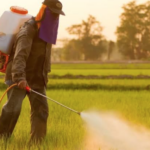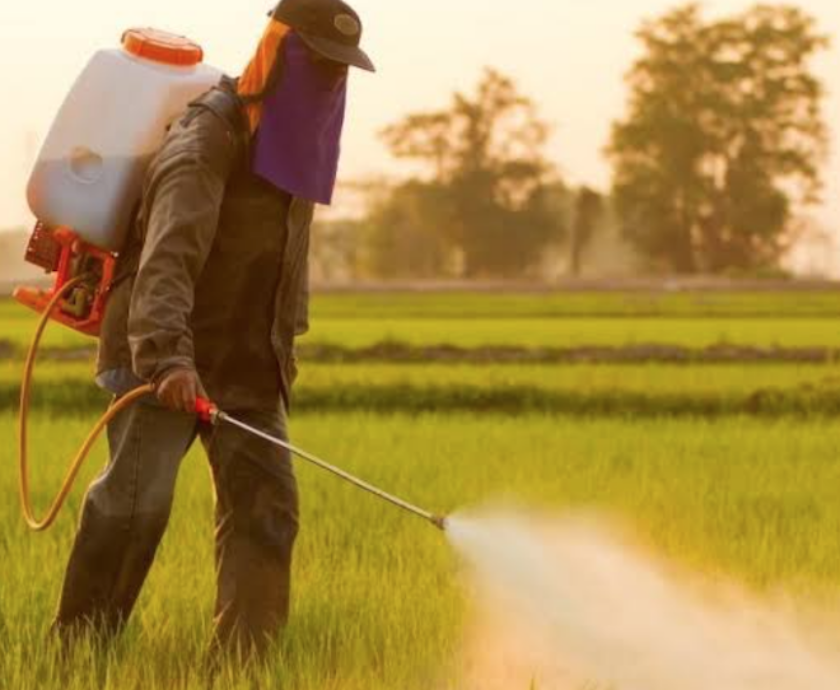Nigerians are dying every day with every meal we consume. Are you shocked? I was as shocked as you are right now when I found this out recently. We have a major problem right before us and it seems like no one is talking about it so here I am, writing about the increasing dangers we face due to the proliferation of Highly Hazardous Pesticides (HHPs) in Nigeria. Do you know over 60% of food produced in Nigeria is produced by small women holder farmers and over 90% of them use chemical pesticides? Most of these chemical pesticides are Highly Hazardous Pesticides (HHPs) that have severe health and environmental impacts when proper application and safety is not within reach.
Chemical Pesticides use leaves residues in the food we eat. Leaving us exposed to their associated risk. Traces of pesticides can be found everywhere from our fruits to our water, vegetables, in the air and even in the bees which are very important in the farming ecosystem. Its dangerous effects are long lasting and devastating. The World Health Organization (WHO) estimates that 385 million people fall ill every year globally from pesticide poisoning. Developing countries in the Global South (Africa, Nigeria inclusive) experience 99% of pesticide related deaths, even though they comparatively produce very little pesticide. A lot of pesticide related deaths are either unreported or attributed to unnatural causes yet pesticide imports into African countries especially Nigeria are increasing, a lot of these pesticides fall into the HIGHLY HAZARDOUS category

Our right to good health and safe environment
Studies have revealed how pesticides contaminate rivers, lakes and groundwater causing too many adverse consequences. These pesticides don’t just endanger our rights to food, they also endanger our right to good health and safe environment. Even the United Nations considers these HHPs a Global Human Rights concern.
One of the major pesticide tragic cases in Nigeria happened in Benue state in 2020 where over 270 people died from an initially diagnosed ‘mystery ailment’. It was later discovered that they had been poisoned by a banned highly hazardous pesticide used by farmers in nearby farmlands that had seeped into the local river.
In 2013, twenty-three school students in Bihar, India, died within minutes after eating a meal of rice and potato curry as part of a lunch program against malnutrition. The investigation found that the meal had been prepared with cooking oil that contained the pesticide monocrotophos. This is why the increasing rate of food poisoning recently in Nigeria has been a serious source of concern for me.
The effects of these HHPs on our poor public health care system is mounting but sadly we can’t even keep track because we lack a proper research and data system which makes gathering information on how these pesticides are used and the impact they are having on human health almost impossible. That is more reason for concern.
In 2018 and 2019, EU countries and the United Kingdom approved the export of a total of 140,908 tonnes of pesticides that are banned from being applied in European fields because of unacceptable health and environmental risks
– Anda Damisa
I was in Abuja recently where I was privileged to hear Mr Jochen Lucksheiter, the director of the Heinrich BÖLL Stifung foundation in Nigeria speak on the dangers we face from the increasing use of Highly Hazardous Pesticides by our farmers in the country. “Based on the research that we have done on pesticides in Nigeria, we have found that what is particularly concerning about the high use of Pesticides in this country is that is that many of the Pesticides that are being used especially by small scale farmers are those that are in the category of highly toxic pesticides,” he said.
And these are already banned pesticides in countries with high environmental and public health standards such as the US, Japan and the EU, but are still being produced and exported to countries like Nigeria, they are also still getting registered and sold legally.
The HHPs list of the international Pesticide Action Network (PAN) currently contains 338 Highly Hazardous pesticides with high levels of acute or chronic hazards to health or environment according to international classifications. Many of these HHPs are still used in Nigeria.











